How Can We Strengthen Children’s Social Skills Through Group Games?
Play is one of the most effective tools for children’s social, cognitive, and emotional development. In recent years, various studies have shown that group games can play a significant role in shaping children’s communication skills, cooperation, and mutual respect. In this article, we will explore the concept of group play, its impact on social development, and examples of useful games for both home and school.
The Importance of Group Games in Children’s Social Development
Group games provide a natural environment for interaction among children. When several children play together with a shared goal, they learn how to play their role within the team, listen to others’ opinions, and manage their emotions in different situations.
-
Through group play, children learn that collective success is more valuable than individual success.
-
Behaviors such as taking turns, cooperating, apologizing, and encouraging others are developed during play.
-
In the play environment, without the pressure of formal teaching, children naturally practice social skills.
The Role of Parents and Teachers in Guiding Group Games
Although play is inherently a free activity, the role of adults in guiding and managing it is very important. Parents and teachers should, while preserving the spontaneity of play, reinforce positive social behaviors indirectly.
Tips for Properly Guiding Games:
-
Create a safe and nonjudgmental environment where children can express their feelings.
-
Encourage discussion after the game; for example, ask children how they felt when they won or lost.
-
Use real examples to teach respect and cooperation during the game.
How Do Group Games Strengthen Social Skills?
1. Enhancing Empathy
In games that require understanding the position of other players (such as role-play or group storytelling), children learn to understand others’ feelings and respond appropriately.
2. Strengthening Verbal and Nonverbal Communication
To succeed in the game, children must express their ideas, listen, and use body language for coordination. This experience improves their speech and communication skills.
3. Learning Emotional Regulation
Group games involve situations of winning and losing. Through repeated experiences, children learn to manage anger, excitement, or frustration.
Examples of Group Games Useful for Social Development
1. “Cooperation Circle”
Children sit in a circle, and each time one of them must, with the help of the others, move an object to the opposite point without using their hands. The goal is to practice cooperation and coordination.
2. “Group Storytelling”
One child starts with a sentence, and each subsequent participant continues the story with another sentence. This game strengthens listening skills, creativity, and respect for taking turns.
3. “Human Puzzle”
Children hold hands and must pass through each other without letting go, then reorganize the circle. This game enhances cooperation and planning.
The Role of Group Play in Children’s Mental Health
Educational psychology research shows that children who regularly participate in group games have lower anxiety, higher self-confidence, and better problem-solving skills. These children also show more appropriate social behavior in school environments.
Frequently Asked Questions About Group Games and Social Skills
Is group play suitable for children of all ages?
Yes, but the type of game must match the child’s age, cognitive development, and interests. For preschoolers, simple physical games are recommended, while for school-age children, mental or structured group games are more suitable.
What if a child refuses to participate in group play?
They should not be forced. It is better to use observation, indirect encouragement, and two-player games to gradually build their confidence until they join the group.
How many times a week should group play be done?
It is recommended to schedule group play at least three times a week at home or school to ensure lasting benefits.
Conclusion
Group games are not only entertaining, but also provide a unique opportunity for indirectly teaching life skills. Through these games, children learn how to make friends, behave politely in groups, and understand the value of cooperation. Parents and educators should recognize this importance and consider play an essential part of children’s developmental process.







